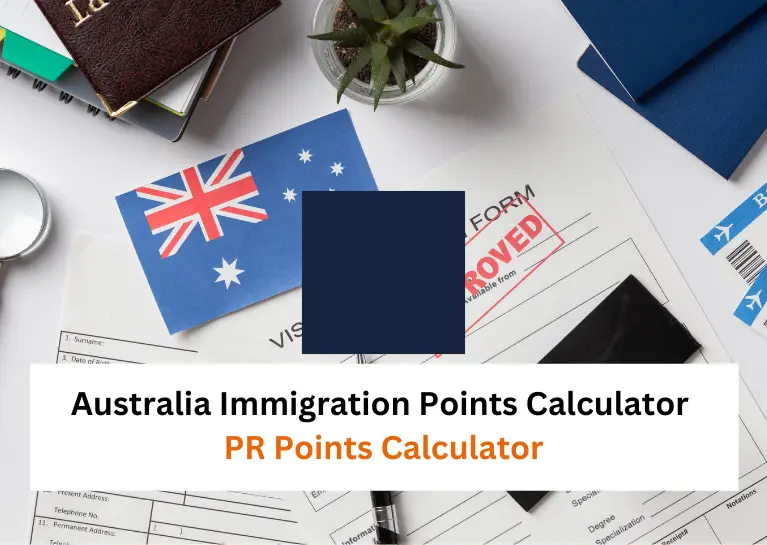Many people dream of living in Canada because of its beautiful scenery, strong economy, and diverse society. Canada has a special immigration system called Express Entry, which makes it easier for skilled workers to move there.
Before you apply, it’s important to understand the Comprehensive Ranking System (CRS). This system uses points to assess and rank applicants’ profiles. Your ranking determines whether you’ll receive an invitation to apply for Canadian Permanent Residency.
Want to know your chances of getting an invitation? Use a CRS Score Calculator! This tool helps estimate if you’ll get invited based on your skills and qualifications. Some people find it really useful. Other people think it’s not so great. But you should try it out to see for yourself!
Table of Contents
ToggleWhat is the Comprehensive Ranking System (CRS) score?
Your CRS score shows how well you match what Canada wants in new residents. It looks at things like your age, education, job skills, language abilities, and more. People with higher scores are seen as a better fit. They get invited to apply for Permanent Residency faster than others. The CRS score is a number that sums up your qualifications for Canadian immigration through Express Entry.
How does the CRS Score Calculator work?
Several reputable online resources offer CRS Score Calculators. These tools typically require you to input information about your:
- Age: Younger applicants (generally between 18-35 years old) receive higher points under the CRS.
- Education: Possessing a Canadian degree or diploma, or an equivalent foreign qualification, grants you additional points.
- Work Experience: Skilled work experience, particularly in Canada or related to in-demand occupations, boosts your CRS score.
- Language Skills: Proficiency in English or French, Canada’s official languages, is a significant point earner.
- Siblings in Canada: Having a close relative who is a Canadian citizen or Permanent Resident grants you additional points.
By entering this information, the CRS Score Calculator estimates your potential score based on the current CRS point system.
Factors Affecting Your CRS Score (The Point System Breakdown)
The CRS point system assigns a specific number of points to each of the aforementioned factors. Here’s a breakdown of how points are typically distributed:
| Factor | Maximum Points |
|---|---|
| Age | 120 |
| Education | 150 |
| Skilled Work Experience | 120 |
| Language Ability (English & French) | 288 |
| Spouse/Partner’s Education and Work Experience (if applicable) | Up to 46 |
| Provincial Nominee Program (PNP) Nomination (if applicable) | 600 |
Maximizing Your CRS Score for Different Visa Types
While the core factors influencing your CRS score remain consistent across various Permanent Residency streams within Express Entry, there might be slight variations. It’s important to consult the specific requirements for the visa program you’re interested in.
Express Entry Points Calculator:
To calculate your CRS score, you may follow the below calculators
- Human capital or Core factor + Common-law partner or spouse factor = 500 points
- Core factor or Human capital + Common-law partner or spouse factor + Transferability factors = 600 points (maximum)
- Human capital or Core factor + Common-law partner or spouse factor + Transferability factors + Additional points = 1200 points (maximum).
Age (Max points: 100 with spouse, 110 without)
| Age(years) | CRS points without spouse/partner | CRS points with spouse/partner |
|---|---|---|
| 17 or younger | 0 | 0 |
| 18 | 99 | 90 |
| 19 | 45 or older | 95 |
| 20 to 29 | 110 | 100 |
| 30 | 105 | 95 |
| 31 | 99 | 90 |
| 32 | 94 | 85 |
| 33 | 88 | 80 |
| 34 | 83 | 75 |
| 35 | 77 | 70 |
| 36 | 72 | 65 |
| 37 | 66 | 60 |
| 38 | 61 | 55 |
| 39 | 55 | 50 |
| 40 | 50 | 45 |
| 41 | 39 | 35 |
| 42 | 28 | 25 |
| 43 | 17 | 15 |
| 44 | 6 | 5 |
| 45 orolder | 0 | 0 |
Education Level (Max points: 150 points)
| Education Level | CRS points without spouse/partner | Master’s degree, or professional degree | |
| Principal Applicant | Spouse/Partner | ||
| Doctoral (PhD) degree | 150 | 140 | 10 |
| Two-year post-secondary credential | 135 | 126 | 10 |
| Two or more credentials, with at least one for a program of three years or more | 128 | 119 | 9 |
| Two-yearpost-secondary credential | 120 | 112 | 8 |
| Two-year post-secondary credential | 98 | 91 | 7 |
| Secondary (high) school diploma | 90 | 84 | 6 |
| Less than secondary (high) school | 30 | 28 | 2 |
| Less than secondary (high) school | 0 | 0 | 0 |
English and French Language proficiency (Max points: 170 with spouse, 160 without)
| First Official Language | CRS points without spouse/partner | CLB10 or more | |
| CLB3 or less | Principal Applicant | Spouse/Partner | |
| CLB10 or more | 0 | 0 | 0 |
| CLB4 | 6 | 6 | 0 |
| CLB5 | 6 | 6 | 1 |
| CLB6 | 9 | 8 | 1 |
| CLB7 | 17 | 16 | 3 |
| CLB8 | 23 | 22 | 3 |
| CLB9 | 31 | 29 | 5 |
| CLB10 ormore | 34 | 32 | 5 |
Canadian Work experience (Max points: 80 points)
| CRS points without spouse/partner | CRS points without spouse/partner | Five years or more | |
| Less than one year | Spouse/Partner | ||
| Five years or more | 0 | 0 | 0 |
| One year | 40 | 35 | 5 |
| Two years | 53 | 46 | 7 |
| Three years | 64 | 56 | 8 |
| Four years | 72 | 63 | 9 |
| Five years ormore | 80 | 70 | 10 |
Canada PR Points Calculator:
To be eligible for a Canada PR visa, achieving a minimum score of 67 out of 100 points is required. Your Canada PR points are assessed based on the following criteria:
| Score points | language Proficiency |
|---|---|
| Age | Maximum 12 points |
| Education | Maximum 25 points |
| work experience | Maximum 28 points (English or French) |
| Additional 10 points (not mandatory). | Maximum 15 points |
| Adaptability | Arranged employment |
| Arrangedemployment | Arranged employment |
CRS Score for Ontario Immigrant Nominee Program (OINP):
The table below illustrates the factors influencing your CRS score and the maximum points you can receive.
| Factors | Maximum points Awarded |
|---|---|
| work experience | 28 |
| Educational Qualifications | 25 |
| arranged employment | 15 |
| Age | 12 |
| ArrangedEmployment | 10 |
| Adaptability | 10 |
The Ontario PNP calculator, also known as the CRS Score Calculator, assists in determining eligibility for the program. Each factor’s score is determined by your inputs. For individuals aged between 20 and 29 with a spouse, the score is 100, while those applying without a spouse can achieve a maximum score of 110.
In the same way, the maximum score will differ based on your highest Educational qualification, work experience, and language proficiency.
Calculate the CRS Score for the Manitoba Provincial Nominee Program (MPNP):
The immigrant needs to meet different requirements to be eligible for Manitoba PNP.
| Factors | Points |
|---|---|
| Language | 20 Bonus points – 5 (if you know both official languages) |
| Age | 10 |
| WorkExperience | 15 |
| Education | 25 |
| Adaptability | 20 |
| Total | 100 |
Important Points to Note:
- CRS score differs with factors of age, highest educational qualification, and Work Experience. The minimum CRS score Calculator points that are needed is 60 points out of 100, and then the applicants can apply for Canada PR.
- The Express Entry program profiles will get an additional 600 points if shortlisted.
- Calculate CRS Score for Nova Scotia, Saskatchewan, and Alberta: Likewise, each province with a Provincial Nominee Program likely has its own resources or CRS Score Calculators specific to its program.
- Must have a valid Alberta job offer and/or work experience; and/or
- Should be a graduate of any Alberta post-secondary institution with a valid job offer from Alberta; and/or
- Can have a Parent, child, brother, and/or sister who is a permanent resident living in Alberta, or a Canadian citizen living in Alberta
| Selection Factors | passing score |
|---|---|
| work experience | 10 |
| Adaptability | 10 |
| Age | 12 |
| passing score | 15 |
| Education | 25 |
| Ability to communicate English/French | 28 |
| Total | 100 |
| PassingScore | 67 |
Ways to Improve Your CRS Score
The good news is that your CRS score isn’t set in stone! Here are some strategies to enhance your score:
- Boost your language abilities: By taking tests like English or French exams and scoring well, you can get more points.
- Get more work practice: Having skilled job experience, especially in Canada or jobs needed a lot, raises your score greatly.
- Higher Education: Getting an advanced degree, mainly in Canada, can really increase your CRS score. Think about joining a post-graduate program. Not only could it add points, but you’d also learn valuable skills Canadian employers want.
- Secure a valid job offer in Canada: Getting a job offer in Canada gives you extra points in the Comprehensive Ranking System (CRS). A positive Labour Market Impact Assessment (LMIA) with the job offer adds 50 to 200 CRS points. Seeking jobs in Canada that match your skills and experience can help. Use websites and apps made for people wanting to immigrate to Canada. These lets you search for jobs and connect with others.
- Explore Provincial Nominee Programs (PNPs): Provincial Nominee Programs (PNPs) are excellent pathways to Canadian Permanent Residency offered by individual Canadian provinces. Obtaining a nomination from a PNP can add a whopping 600 points to your CRS score, effectively guaranteeing an Invitation to Apply (ITA). Research PNP programs in provinces that align with your interests and career goals. Each province has its own eligibility criteria and application process, so consulting with an immigration consultant specializing in PNPs can be highly beneficial.
- Improve your spouse or partner’s qualifications (if applicable): If you are entering Express Entry with a spouse or partner, their education, job, and language skills can add to your total score. Help your partner improve their language skills through tests. Consider letting them get job experience in Canada.
- Maintain a valid Express Entry profile: While your CRS score is a crucial factor, it’s not the sole determinant for receiving an ITA. Keeping your Express Entry profile updated with the latest information and ensuring its validity throughout the application process is essential.
- Leverage the power of technology: Several online resources and mobile applications can assist you in your immigration journey. Utilize reputable CRS Score Calculators to track your progress and explore tools that connect you with potential employers in Canada.
Cut-off Scores in 2023
Getting an Invitation to Apply (ITA) doesn’t only rely on your Comprehensive Ranking System (CRS) score. It’s very important, but there’s more to it. You must keep updating your Express Entry profile. Any new details should be added right away. Your profile needs to stay valid through the whole application process too. Not doing these things could really hurt your chances.
Conclusion: How Can Expert Opinion Help You?
The CRS Score Calculator serves as a valuable starting point to gauge your potential competitiveness in the Express Entry pool. However, navigating the intricacies of Canadian immigration can be overwhelming. This is where seeking guidance from an experienced immigration consultant can prove invaluable.
Here’s how an expert can assist you:
- Comprehensive Evaluation: An immigration consultant can assess your profile in detail, identifying areas where you can strengthen your CRS score.
- Strategic Planning: They can develop a customized immigration plan tailored to your specific goals and qualifications.
- Application Support: From gathering necessary documents to ensuring application accuracy, an expert can guide you through the entire process.
- Provincial Nominee Program (PNP) Expertise: Consultants can advise you on PNP programs that might be a good fit for your profile and help you navigate the specific application requirements.
Remember, Canadian immigration is a competitive process. By seeking professional guidance and utilizing tools like the CRS Score Calculator, you can significantly increase your chances of receiving an ITA and embarking on a fulfilling life in Canada.







